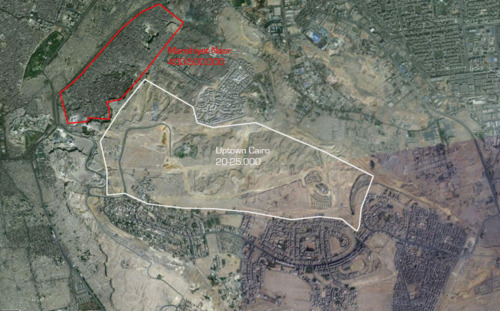Cairo’s colonial cities
Overshadowed by the continuing events in Tahrir Square yesterday (the Egyptian Army’s full war against civilian Egyptians in their own country), is another piece of news that would typically have been major: There was no water in many parts across central Cairo from Abasiyya to Zamalek. This is a very rare situation in this part of the city while it maybe not that unusual to the Mubarak satellite cities such as 6th of October. Those cities are on higher ground (water must be pumped up), built on absolute dry desert, with low density while using some of the highest quantities of water per day in Egypt due to the lush gardens and golf courses that are hardly used but remain an important symbol of status. Despite being home to some of Cairo’s most expensive real estate water problems in such areas is not unusual. Yet for water to be unavailable in the center of the city, which is in the Nile Valley (low ground) and where water is readily available, is a catastrophe. Apparently the water cut was due to a ruptured water pipe near Ramses Square which was so serious that trains at the station had to be redirected to Giza Station.
Meanwhile, while civilians in Tarir Square were showered with tear gas canisters and while large chunks of the city center was water-less, construction work continued on a new gated development also with a golf course in the heart of the city. Uptown Cairo is an Emaar development whose tagline is “be above it all” and which sits atop the Muqattam hills overlooking the Citadel with sweeping views over the city. Water for the golf course above this desert plateau will also need to be pumped up to maintain a green turf centered between 4000 multi-million pound homes.
The land was owned by the army, as is all land around the city which later became desert gated communities. These sales are opaque and are marred in mystery. Uptown Cairo land is said to have been sold for LE92 a square meter when it was valued at LE2200. The logic typically is that this kind of project is good for Egypt, good for Cairo, looks like progress and therefore it should be promoted with the sale or (give away) of land. In reality such projects create a further and deeper division in Egyptian society, and rewards the wealthy while punishing the rest of society whose share of resources is under threat by the rich minority who are given priority.
Directly at the base of Muqattam Hills is one of Cairo’s densest areas, Manshyiet Nasr, also known as Garbage Village where about %90 of Cairo’s recyclable trash is processed. The total area of Uptown Cairo is about three times the area of Manshyiet Nasr which has a population of roughly 450-500,000 inhabitants (compared with Uptown Cairo which is to house 20-25,000). Where is the social justice in these numbers?

The government and the army have fully subsidized desert cities placing all their efforts and weight behind the notion that Cairo as it is can not be dealt with and therefore the desert cities are the only escape. Furthermore these developments are fully geared towards private car ownership (while only %15 of Cairo households own private cars) and absolutely no investment in improving existing modes of public transport or providing new ones to service those new desert communities.
Public housing built in desert cities include tens of thousands of units. Such projects have completely failed as the state give a plot of land to a contractor and demands a certain number of units with a limited budget to be fit within that plot. Without an overall urban plan, the contractor then is obliged to fit the required units within the plot in such a way that has no relationship with the city or context and which does not make for a cohesive city plan. This in addition to lack of basic services, work and transport options.
On the other hand, gated communities evolve as an escape for the new middle class (a class that emerged from the 1970s under Sadat’s open door policies and which isn’t a continuation of the middle and upper class that existed before the 70s). The new middle and upper class developed a serious case of hate against Cairo and its people adopting racist, almost colonialist, attitudes towards the lower classes. Along with this attitude towards the common people of the city, a stigma was attached to historic urban areas such as downtown and “Islamic Cairo.” It is the result of a defeated class, willfully forgetting history and heritage and aiming to forge a new identity in the desert.
This marks a serious departure for Cairo’s urban history along class lines. All throughout Cairo’s history, the wealthy always lived within the city core or in accessible areas to all social classes. The urban elite was invested in the city as a cohesive unit and supported various urban projects including the city’s extensive tram network. When the wealthy wanted to build a new city in the nineteenth century they wanted it to link to the old city at Azbakiyya. And later when private companies developed neighborhoods for the wealthy at Heliopolis, Garden City and Maadi, there were no walls or gates built around them. The class division created in Urban Cairo with new gated colonies is a disturbing, unhealthy and unsustainable development in Egyptian cities and society. The below comment is posted in response to the video at the top of this post and it encapsulates a common sentiment among Egypt’s middle, upper middle and upper class.
Colonization and colonial cities were not only about racial difference! Cairo’s gated colonies are on par with colonial urbanism: a favored minority creating zones of exclusivity benefiting from special benefits from the state, direct access to resources, using cheap labor of the locals and are backed and protected by a militarized government. WE ARE WITNESSING NOTHING SHORT OF COLONIZATION. Unfortunately Egypt’s elite are growing further away from Egypt while living in it. They are growing more ignorant of their own people, their own rich urban heritage and its potential. Golf courses must stop because when the water dries up everyone will suffer. Gated communities have proven to be a disaster to Egyptian society and to Cairo as they create a further divided society and city and promote avoiding confronting our national and societal problems. The moneyed and educated elite need to reconsider this social and urban model.
11 notes
osab3 reblogged this from cairobserver
osab3 liked this
mcbudd reblogged this from cairobserver
cairobserver posted this


